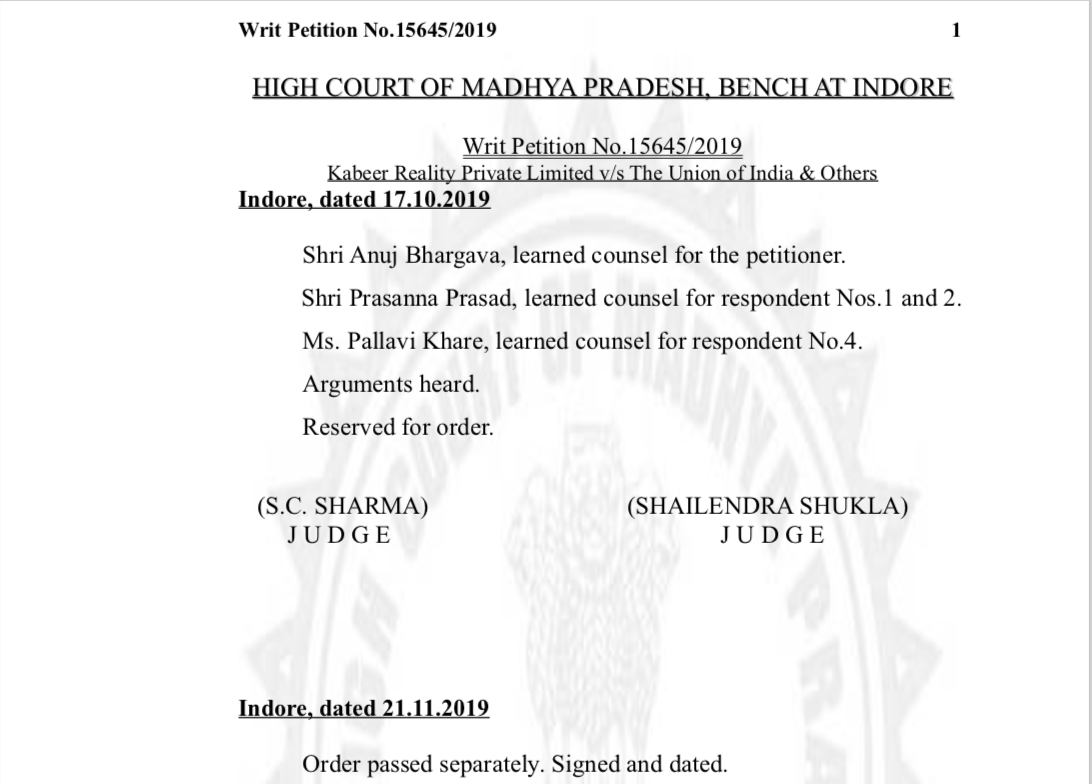Direct recovery when 3b is not filed
Introduction:
Direct recovery u/s 79 can be initiated when the taxpayer filed GSTR 1 but skipped GSTR 3B. Direct recovery when 3b is not filed can be done.This is a landmark case. The impact of filing of GSTR 1 and then not paying tax by filing GSTR 3b is discussed. The taxpayer filed some of the GSTR 1 but never filed GSTR 3b. The ITC of the same was reflected in 2A and taken by the recipient. Department sent notices to him but it was returned. then department initiated the proceedings u/s 79 of CGST Act. Tenants were asked to pay the rent to deptt against tax. The applicant filed this case. let us see how it was settled by MP high court, Indore bench. You can read the original order here.
Facts of the case of Download Kabeer Reality Private Limited v/s The Union of India & Others:
Respondent No.1 has again issued a notice to the tenants of the petitioner / Company under Section 79 (1)(c) of the Act of 2017 initiating recovery against them in respect of a sum of Rs.44,43,804/- on account of tax, cess, interest etc. payable under the provisions of Section 79 of the Act of 2017. The petitioner / Company has submitted a reply on 15.07.2019 and it’s grievance is that the notice/order dated 08.07.2019 is per se illegal and has been Writ Petition No.15645/2019 5 issued contrary to the statutory provisions as contained under the Act of 2017. 05. The petitioner / Company has raised various grounds before this Court and it has been stated that respondent No.2 has not
followed the prescribed procedure relating to demand and recovery, as provided under the Act of 2017. It has also been
contended that without determination of tax payable by taxable person, no recovery could have been initiated under Section 79 (1)(c) of the Act of 2017.
It has also been argued that in absence of determination of tax under Section 73 of the Act of 2017, no recovery can be made against the petitioner, as no notice of demand was ever issued to the petitioner / Company.
Observation of Honourable MP high court:
Some important observations made by court are compiled here:
Rule 61 Sub-rule (3) of the GST Rules;
Every registered person furnishing the return under sub- rule (1) shall, subject to the provisions of section 49, discharge his liability towards tax, interest, penalty, fees or any other amount payable under the Act or the provisions of this Chapter by debiting the electronic cash ledger or electronic credit ledger and include the details in Part B of the return in FORM GSTR-3.”
- There are twin effect of such non-filing of GSTR-3B Return, first is that no revenue is actually transferred to the Government and on the other hand, the persons / tenants, to whom the petitioner has issued invoices, would avail GST credit. GSTR-1 Returns are being filed in accordance with Rule 59 (1) of GST Rules and GSTR-3B Returns are being filed in accordance with Rule 61 sub-rule 3 of the GST Rules.
- This Court is of the considered opinion that the tax determination has already been done in the present case, as the
petitioner itself has quantified its tax liability under the GSTR-1 Returns. The petitioner’s contention that in absence of
determination of tax under Section 73 no recovery can be made, is unfounded and in fact Section 73 has got no application in thefacts and circumstances of the present case. -
The respondents have stated that the moment the clients have been issued invoices for providing taxable services and
charged the GST also, the tenants are entitled to avail the ITC under Section 2 (62) of the Act of 2017 and in the present Writ Petition No.15645/2019 13 circumstances, in which the petitioner failed to deposit the GST for the period w.e.f. April, 2018 to May, 2019, the credit availed by the tenant on the basis of invoices issued by the petitioner also became invalid / ineligible despite no fault on their part.
 CA Shafaly Girdharwal
CA Shafaly Girdharwal
CA
New Delhi, India
CA Shaifaly Girdharwal is a GST consultant, Author, Trainer and a famous You tuber. She has taken many seminars on various topics of GST. She is Partner at Ashu Dalmia & Associates and heading the Indirect Tax department. She has authored a book on GST published by Taxmann.








